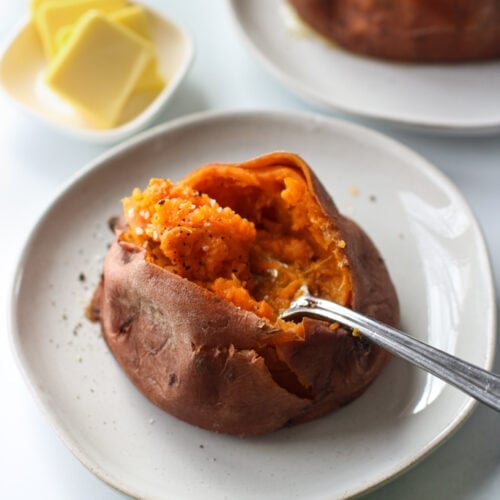Here at The Real Food Dietitians, we love sweet potatoes. As nutrition experts and recipe developers, we have been fans of this healthful ingredient for many years. Learn more about the special sweet potato nutrition benefits and why we love to use this ingredient in many types of recipes and meal plans. You also may be wondering “What Are Sweet Potatoes?” “What Are the Benefits of Sweet Potatoes”, and that age-old question: “Is A Yam and Sweet Potato The Same Thing?”. Read on to get the answers to those questions right here.
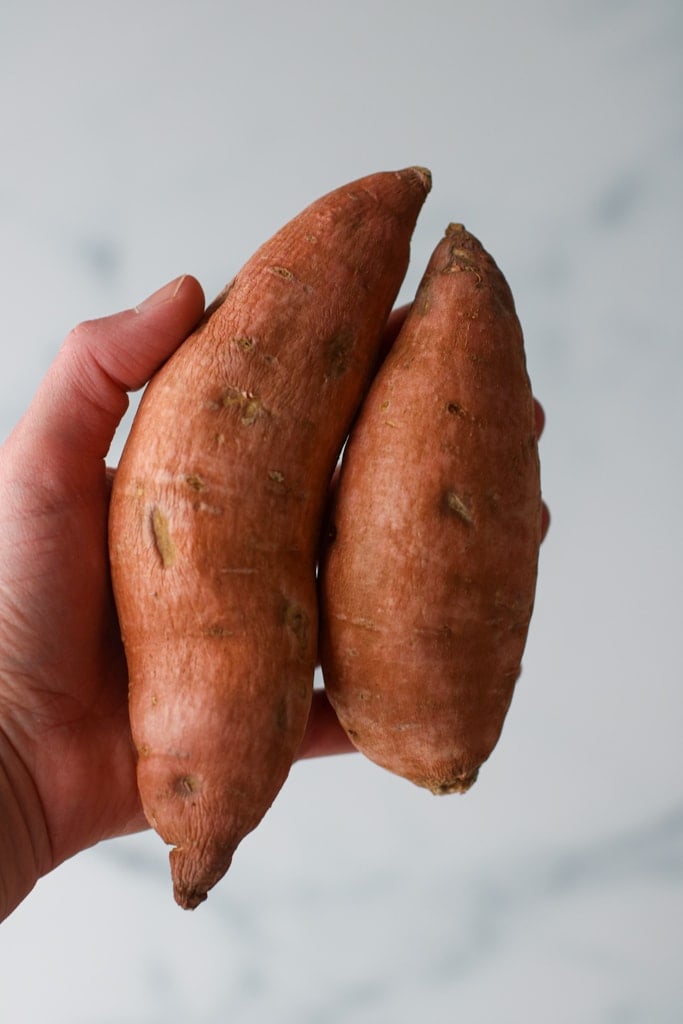
Sweet Potato Nutrition Benefits At A Glance
Sweet potatoes are a delicious whole food known for having these nutrition benefits:
- an excellent source of fiber
- contain a high amount of vitamins (A, C, B6) and minerals (manganese, copper, and potassium)
- a rich source of powerful antioxidants
What Are Sweet Potatoes?
Sweet potatoes are a vegetable that’s classified as a root vegetable or tuber. They are a starchy sweet-tasting vegetable that grows under the ground and is native to tropical areas of North and South America. On the surface, sweet potatoes grow as a perennial vine. Sweet potatoes are available year-round, and they are at their peak from November to March. When shopping, choose small to medium sweet potatoes that feel heavy for their size.
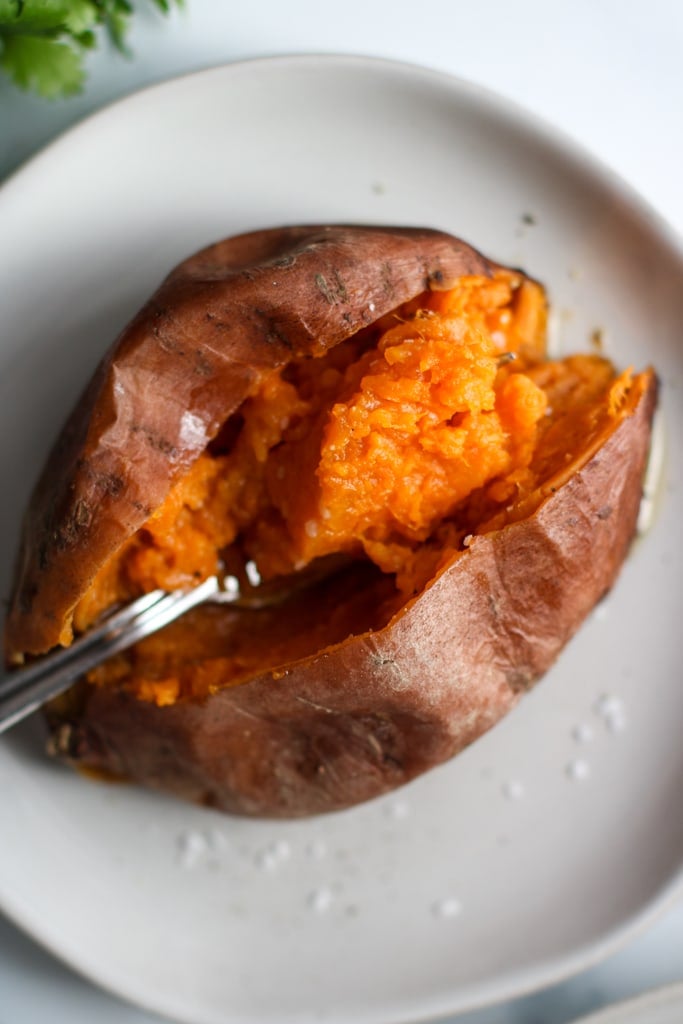
What are the types of sweet potatoes?
When you think of a sweet potato, what comes to mind is probably a long, odd shaped potato with copper colored skin and rich orange flesh. This is the most common type of sweet potato grown and used in recipes, referred to as a Jewel sweet potato. But there are many other types of sweet potatoes ranging in color from creamy white to purple. Some other popular varieties of sweet potatoes include the Beauregard, O’Henry, Korean Purple, Garnet, and Stokes Purple.
Purchasing Sweet Potatoes
When buying sweet potatoes, look for ones that are small to medium in size and feel heavy for their size. Store sweet potatoes in a cool, dark place (not the refrigerator) for up to 3 weeks.
Sweet Potato Nutrition And The Benefits Of Sweet Potatoes
The sweet potato nutrition benefits make this food a great choice for adding to your healthy meals. Here’s more about why sweet potatoes are a nutritious choice and 3 reasons to eat more of them:
- Sweet potatoes provide an excellent amount of fiber. And if you eat the skin of a sweet potato and not just the inner flesh, you get even more fiber. The fiber in sweet potatoes is both soluble and insoluble, so sweet potatoes are great for helping to improve digestion, as well as feed your good gut bacteria, known as your microbiome. Having a healthy gut microbiome is beneficial for many reasons, ranging from skin and heart benefits to lowering inflammation and may even be connected to improved mood and clearer thinking.
- These root vegetables are also high in vitamin A. Sweet potatoes contain a variety of vitamins, including C and B6, but they are most known for containing an extremely high amount of vitamin A, which your body needs for eye health, skin health, gut health, bone health, and a properly functioning immune system.
- Sweet potatoes contain some powerful antioxidants. The main type of antioxidants in sweet potatoes is called anthocyanins, which have been linked to lowered inflammation and keeping harmful free radicals in check.
How To Cook Sweet Potatoes
Learn the best way to cook sweet potatoes in these step-by-step photo tutorials. Now you can master sweet potato cooking and enjoy this versatile and healthy ingredient in may ways.
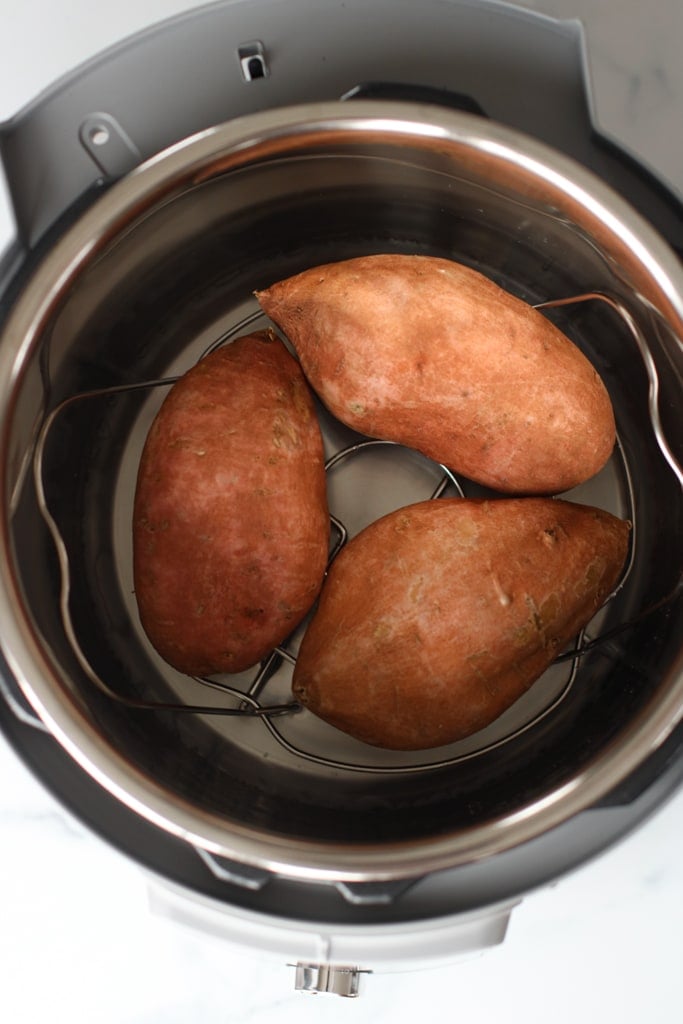
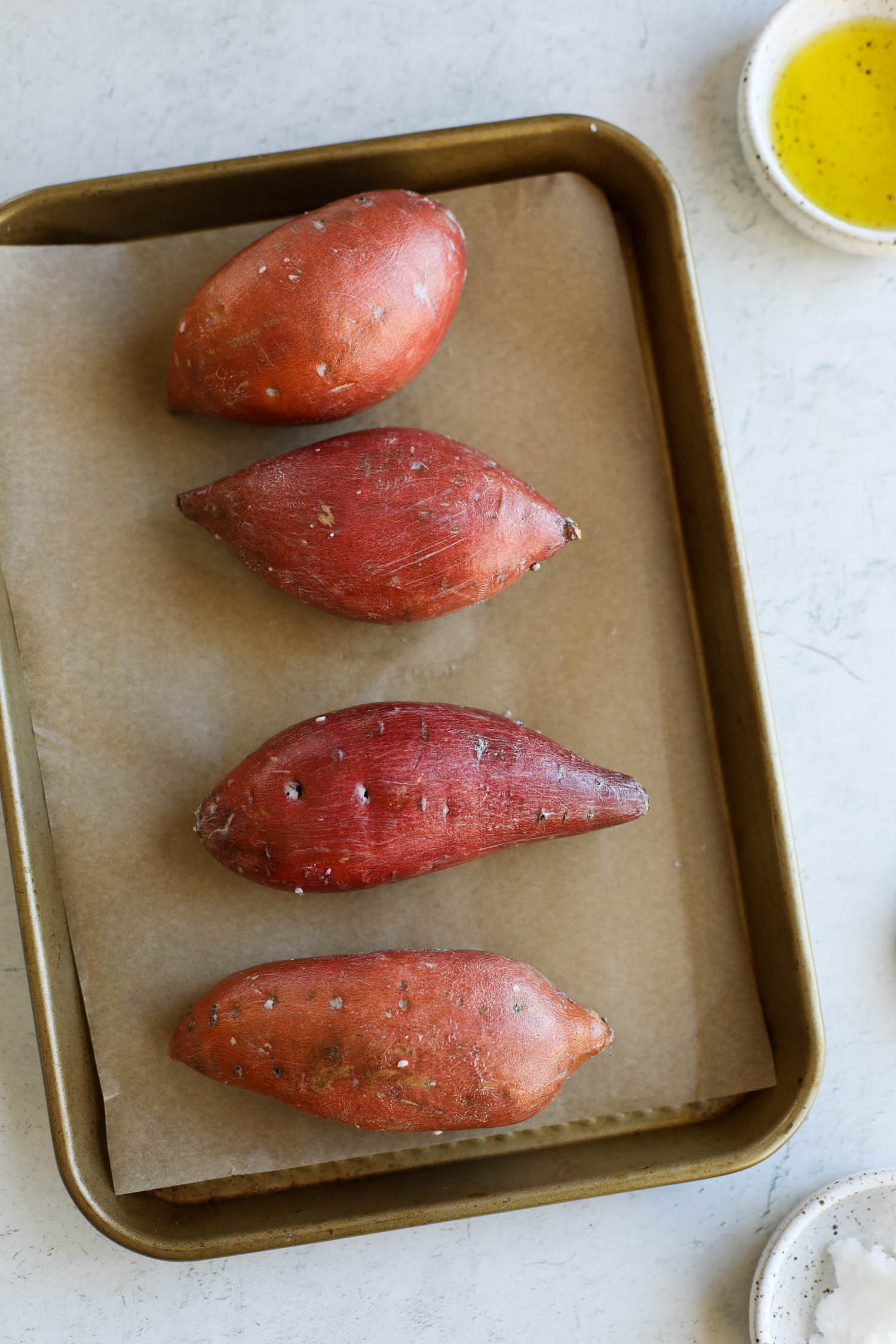
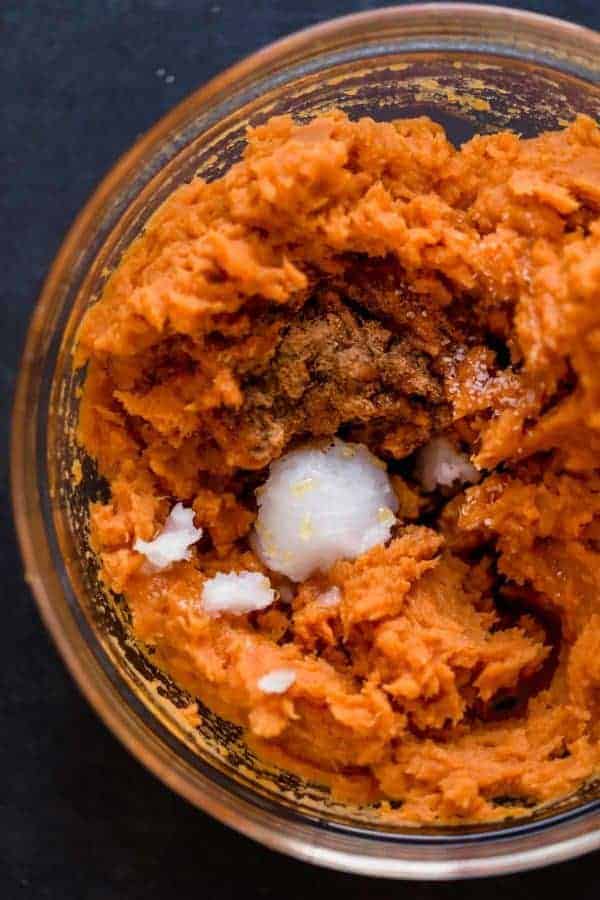



7 Common Ways to Cook Sweet Potatoes
Click on any of the photos above or the links below to see instructions and recipes for incorporating sweet potatoes into your meals and meal plans:
- How To Cook Sweet Potatoes In the Instant Pot
- How to Bake Sweet Potatoes In The Oven
- Making Mashed Sweet Potatoes
- Roasting Sweet Potatoes On A Sheet Pan
- Adding Sweet Potatoes to Chili
- Making Sweet Potato Toast
- Adding Sweet Potatoes to A Breakfast Hash
The Best Sweet Potato Recipes On The Internet
From baked whole sweet potatoes to sweet potato chili and tacos and even sweet potato buttermilk biscuits, this collection of healthy sweet potato recipes offers many great choices for sides and main dishes that call for sweet potatoes.
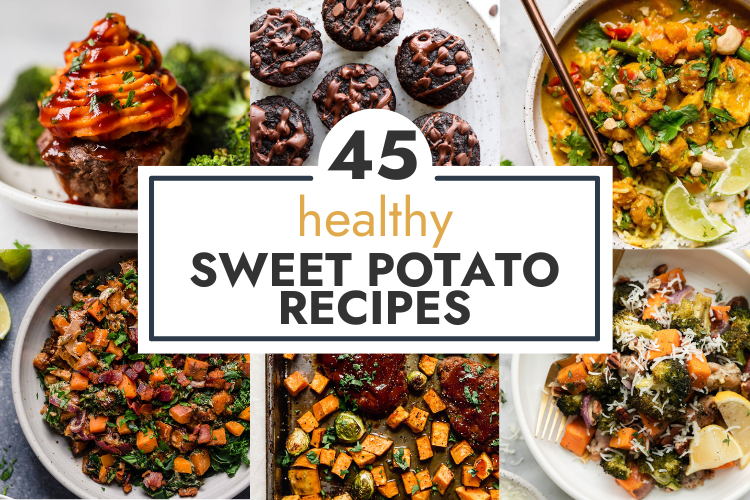
What Are Sweet Potato Nutrition Facts?
One small (approximately 5-inch) sweet potato or 1 cup of cubed sweet potato contains:
- 115 calories
- 0 grams total fat (0 grams saturated fat)
- 27 grams carbohydrate (4 grams fiber, 6 grams sugars)
- 75 milligrams of sodium
- 2 grams of protein
- 0 milligrams of cholesterol
Are Sweet Potatoes Gluten Free?
A common question we get is whether or not sweet potatoes are gluten free. Yes, sweet potatoes (and all forms of potatoes) are a naturally gluten-free food. We think sweet potatoes are a great ingredient to increase the fiber and nutrition in gluten-free recipes.

What’s the difference between a yam and a sweet potato?
Many people get confused by the difference between a yam and a sweet potato. Though they are similar, both being starchy root vegetables, yams and sweet potatoes are definitely not the same thing and have some key differences. From the outside, yams have a darker and rougher exterior, sometimes being compared to tree bark. Whereas sweet potatoes have a rusty or copper colored exterior that has some knots and strings attached to it, but is overall more smooth than the skin of a yam. On the inside, yams have a more starchy white flesh (there are some other colors of yams, but white is most common), similar to that of a regular potato. But the inside of a sweet potato is deep orange colored and more sweet.
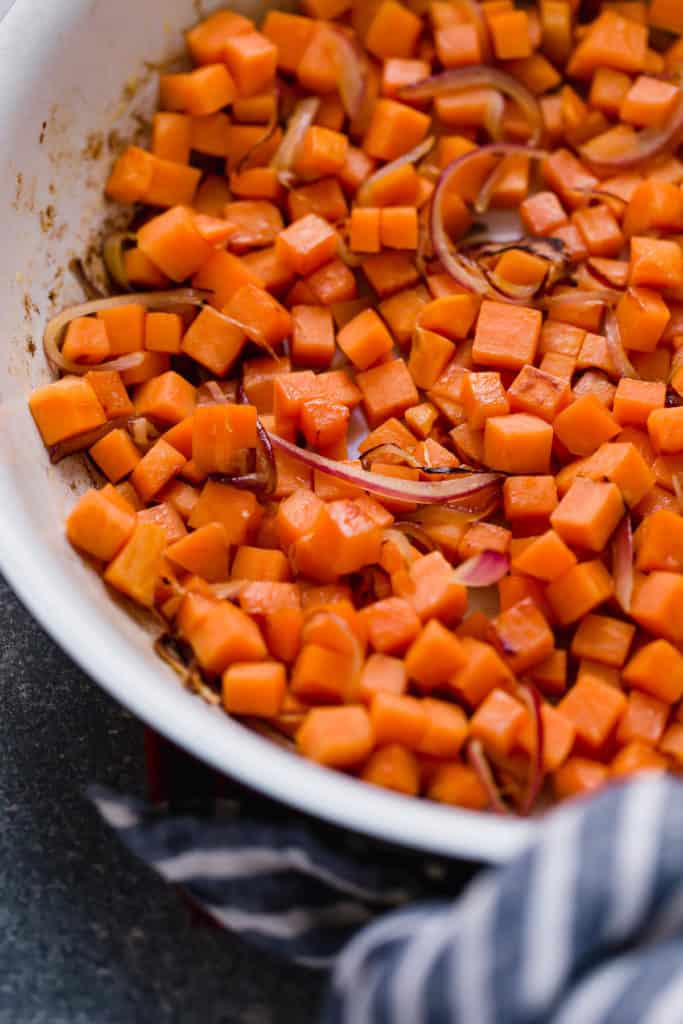
Frequently Asked Questions
The main nutrition benefits of sweet potatoes include the high fiber content, vitamins, minerals, and antioxidants. Scroll up to read more about these health benefits of sweet potatoes.
Yes, sweet potatoes are a nutritious plant-based food that offer many benefits, including a high amount of fiber, vitamins, minerals, and antioxidants.
One of the best things about a sweet potato is that it can be enjoyed in many ways, including baked whole, diced and roasted, boiled and mashed, as sweet potato fries, made into sweet potato buttermilk biscuits, sliced thin and added to a sheet pan dinner, cooked in an Instant Pot, and even as a topping for meatloaves or shepherd’s pie.
Store sweet potatoes in a cool, dark place for up to 3 weeks. These are long-storing vegetables, meaning you can keep them on hand for a few weeks. Do not refrigerate sweet potatoes, which can cause them to harden in the center.
Yams have a more starchy and less sweet interior, whereas the flesh of a sweet potato is creamy and naturally sweet. Read above for more differences between a yam and a sweet potato.
Pin It Now To Reference Later
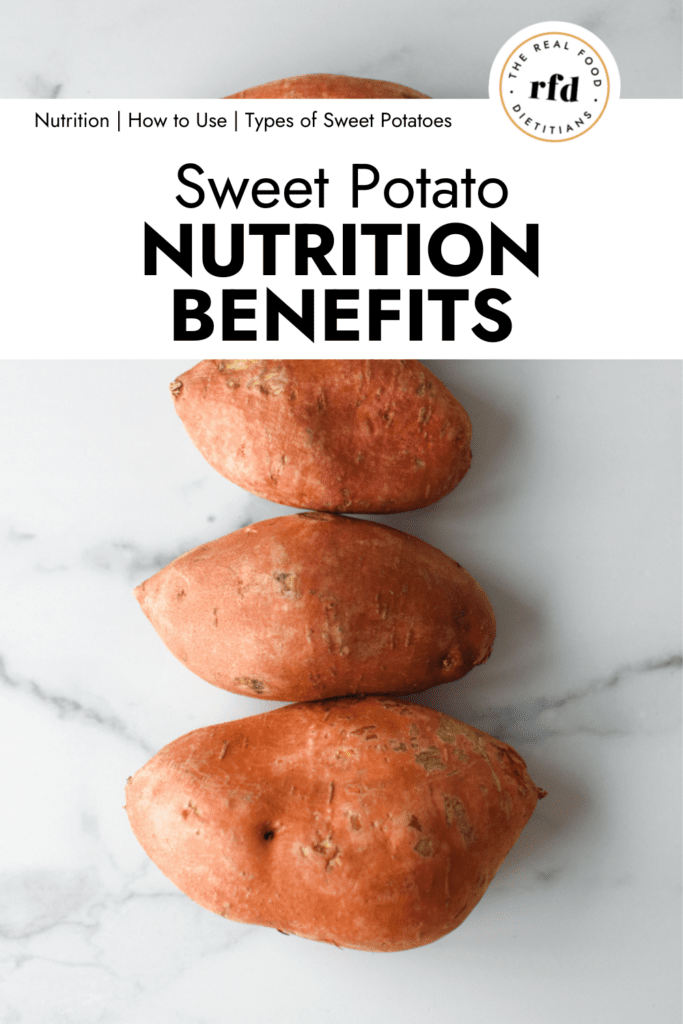
For ultimate success, we highly recommend reading the tips in the full blog post above. All photos and content are copyright protected. Please do not use our photos without prior written permission. If you wish to republish a recipe, please rewrite the recipe in your own unique words. Link back to the source recipe here on The Real Food Dietitians. Thank you!


